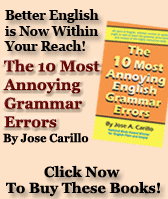- HOME
- ENGLISH FORUM
- BADLY WRITTEN, BADLY SPOKEN
- GETTING
TO KNOW ENGLISH - POUR OUT YOUR MIND IN ENGLISH
- GOING DEEPER INTO ENGLISH
- ADVICE AND DISSENT
- MY MEDIA ENGLISH WATCH
- NOTABLE WORKS BY OUR VERY OWN
- ESSAYS BY JOSE CARILLO
- ABOUT JOSE CARILLO
- TIME OUT FROM ENGLISH GRAMMAR
- NEWS AND COMMENTARY
- BOOKSHOP
- ARCHIVES
NEWS AND COMMENTARY
| WORLD NEWS | COUNTRY NEWS |
COMMENTARY | MEDIA RELEASES |
Philippines:
Sexism in the English language
By Alito L. Malinao, columnist, The Manila Times
A few years back when I attended a seminar on linguistics one of the resource speakers, a professor of Ateneo de Manila University, defined anthropology simply as “the study of man. ”
But he quickly corrected himself by saying that someone had earlier questioned his definition because it did not include women. He then said that anthropology is “the study of man on top of a woman.”
The professor was just trying to be cute or funny. But one lady participant stood up and angrily accused the professor of using sexist language She pointedly told the professor that that was not the way to treat women because he too has a mother or maybe some sisters.
Yes to multilingual education
By Bobit S. Avila, columnist, The Philippine Star
August in this country is always called “Buwan ng Wika” as the Department of Education (DepEd) and the National Commission on Culture and Arts (NCCA) try their best to promote our so-called national language that ultra-nationalists call the “Filipino Language”. This year’s theme is “From Baler to the Rest of the Philippines”. What has the town of Baler got to do with our national language? I can only second guess that it is due to the fact that President Manuel L. Quezon hailed from Baler and he is dubbed the “Father of the National Language”.
But whenever I and friends talk about our national language, many Filipinos especially those living outside Metro Manila still resent the idea of having only one language to distinguish ourselves as Filipinos. Perhaps it is time for those ultra-nationalists to realize that “Filipino” as it is spoken today is 99.9 percent Tagalog…United States:
Blood, sweat, and words
By Joseph Epstein
Grit, the overcoming of serious obstacles through determined effort, is most impressively on public display on the battlefield, in athletics, in every sort of comeback in the larger game of life, with its all-too-frequent peripeteias. To watch someone showing grit, winning through against impressive odds, is always a grand, exhilarating experience.
Where grit must always be hidden, though, is in art. Art is by nature about hiding the struggle: the wrestle with words for the writer, with time and sound for the composer and performer, with the stubborn materials in the hands of the visual artist. Art is about emerging from that struggle victorious and showing not the least sign of strain, which is to say grit, for having done so. The artist in effect says, Look, Ma — you, too, World, look! — No hands! Art is about making things seem effortless, or so at the least is the art I most enjoy.
Do my two previous paragraphs seem effortless to you? Do you suppose I revised and reworked them several times, or did they just roll out, like the barrel in the famous barroom song?Bierce’s Bugbears
By Jan freeman
Host is a noun, not a verb. People are healthy; foods are healthful. You lie down to sleep and lay down your pencil. A dilemma involves two choices. Usage rules like these, especially if we learned them young, tend to have the ring of eternal truth. We rarely ask ourselves which ones reflect centuries of actual practice and which are as (relatively) newfangled as airplanes and frozen peas.
And after all, why would we? We still read Conrad, Austen and Swift, a century or three later, without much difficulty; it’s reasonable to assume that the usage nits of their times were more or less the ones we’re still picking today.
Reasonable but not true, as Ambrose Bierce recently taught me. Bierce, the American journalist, satirist and Civil War memoirist, is as readable today as he was when he published “The Devil’s Dictionary” and “An Occurrence at Owl Creek Bridge.” But his advice on English usage — published in 1909 as “Write It Right: A Little Blacklist of Literary Faults” — is often mysterious, perverse and bizarre.







